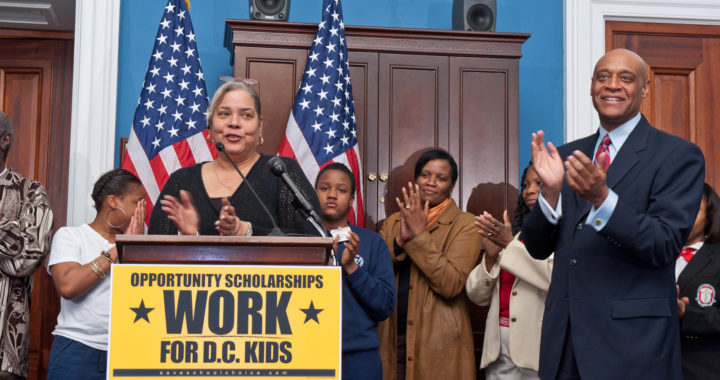When I saw my son failing and getting into trouble in the school where he was districted, it scared me. I knew I needed to do something to make sure he didn’t go down the same road I saw too many young people go in D.C., one that led to despair. My older two children had navigated the public school system with minimal turbulence but my youngest son was a different story. The district public school system did not fit him or what I believed he needed to thrive.
I had no idea what I would go up against in my fight to find more opportunity for my own son, and for other children who needed more options too. I spoke with other parents who were like me — single moms and low income families, struggling to raise children in the inner city. They too knew that their children deserved more educational opportunity than they were receiving but there were a few things in common that held back our voices. The general consensus was this:
- No one listens to poor people – we have no voice. There is a misconception that parents from lower income brackets do not know enough about their children to make educational decisions for them. It is better, according to so-called experts, for educators and legislators to make those decisions. If you are poor and uneducated yourself, you are not treated as if you have an equal voice at the table when it comes to making decisions about your own children.
- Speaking out could affect whatever assistance we are receiving if we talk too much about how terrible it is for our kids. I know many parents who are very grateful for whatever assistance they receive for their children, whether that be individual educational plans (IEPs) through public schools or partial scholarships to private ones. That attitude of gratitude does not negate the fact that more choices for families benefits everyone. Parents can appreciate what is being done to help their children but not be satisfied with limited options.
- Even if we speak out, nothing will change. This mentality is helplessness at its finest. I get it because I’ve been there at various points in my life and for various reasons. With other parents by my side, raising their voices with me, I was able to overcome my doubts that we could move mountains. I knew we could – but I continued to encounter parents who felt overwhelmed by the task at hand.
- Education is for the wealthy kids who can go on to college and live the American Dream. Our kids won’t have those chances or choices. This point is similar to the first one I made but goes a little further. In some cases, the poor feel overlooked but know that they can propel their children to a higher status with enough hard work and guidance. The parents in this category are disenchanted with the promise of the American Dream. They do not believe it is attainable for everyone because they have been made to feel this way. Fighting for school choice and opportunities for their kids is futile for them. I’ve met some of these parents and I feel their pain acutely. Their families deserve access to the American Dream through educational opportunity.
- Politicians will eventually fix the schools. We just have to wait. The promise of public school reform has never seen fruition and if we wait for it to sort itself out, generations of children will miss out on the education that is custom-built to meet their needs. There is no reason to sit back and wait when there are educational options worth fighting for already available.
I list these challenges that parents face in the fight for school choice to bring to light the types of doubt that we are up against when looking out for the best interest of our children. When we know more about the struggle, we can face it head on and reach better solutions for American families.
I will continue fighting for educational opportunities for all children, including yours, no matter what doubts you may have along the way.
